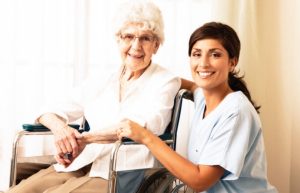How Professional Caregivers Ensure Proper Post-Hospital Care?

Did you know that without proper post-hospital care, 20% of seniors are readmitted to the hospital within 30 days? This 20% re-admission rate is influenced by factors outside the hospital, including poor social support, less access to outpatient care, and poverty.
One study showed that without home care assistance, odds of seniors being re-admitted within 30 or 60 days doubled.
Yet there are some seniors who refuse post-hospital care believing that they will quickly regain their independence.
The first 72 hours are the most important for post-hospitalization patients. Patients are fatigued, have a depressed immune system, and family members are often helpless.
That is where professional caregivers help.
How Do Professional Caregivers Give Proper Post-Hospital Care?
Post-discharge, patients and their families have a number of care instructions to deal with, and it becomes difficult to manage them all. It causes confusion that leads to errors in an older adult’s recovery.
Most readmitted patients go through readmission due to medication errors and confusion in post-hospital care. A professional caregiver minimizes the gaps in care, watches out for the red-flag symptoms, and helps seniors take medicine as prescribed.
Here are other ways that professionals help recovery after discharge:
Medication Management
While recovering after a hospital stay, older adults have to deal with a number of medications addressing their ailments, inflammation, blood pressure, and other issues. For maximum efficacy, it is important that they take their prescribed medicine on time and at proper dosage.
Professional caregivers provide medication reminders and follow the prescriptions. They also help with cooking nourishing meals ahead of time so that the patients gets better in no time.
Helps with Personal Hygiene
Personal care is one of the most important yet difficult parts of recovery. When an older adult makes an effort to maintain good hygiene, it reduces the risk of illness and health complications.
At the same time, they feel refreshed and get comfortable with themselves.
Caregivers help the seniors take care of their personal needs and help them safely move in and out of the shower.
Safe Mobility and Transfers
In the days following discharge, senior patients deal with new conditions that lead to limited mobility, illness, stroke, and other health issues.
A professional caregiver helps the individual move to and fro while reducing the risk and fear of falls. They not only help her to do these things but also provide encouragement and companionship throughout recovery.
Encourage Medical Follow -ups
There are post-hospitalization patients who don’t see a doctor after they are discharged. This behavior makes them more susceptible to pain, infection, and sometimes readmission.
Caregivers take this burden off of families and help patients arrange appointments, transport, and assist them in attending their scheduled visits. They also monitor progress and ensure that a consistent care routine is followed.
Professional caregivers work with other home health providers, pharmacists, and therapists to make sure that the patient is keeping up with wound care, therapy, and other elements of recovery. They make the transition from hospital to home smooth and help the patient to get back to her routine while mitigating risks and complications.